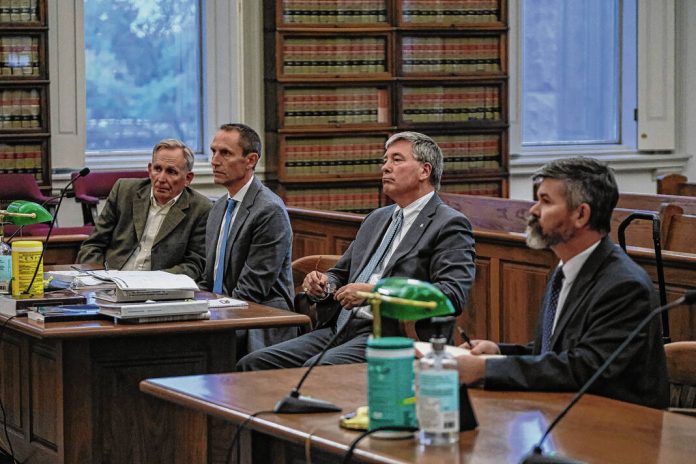
Mike Wolanin | The Republic Columbus City Council District 6 candidate Joseph Jay Foyst, from left, his attorney George “Jay” Hoffman III, attorney Peter King, representing the Bartholomew County Election Board, and attorney Ross Thomas take part in a pretrial hearing for Ross Thomas’ lawsuit against Joseph Jay Foyst and the Bartholomew County Election Board at the Bartholomew County Courthouse in Columbus, Ind., Monday, Oct. 16, 2023.
Bartholomew County Democratic Party Chair Ross Thomas has filed an appeal challenging a decision from a special judge last month that upheld the candidacy of Republican Joseph “Jay” Foyst, who was elected to the Columbus City Council this past November amid a lawsuit challenging his eligibility.
The appeal, filed Wednesday in the Indiana Court of Appeals, seeks to overturn the Jan. 17 decision by Special Judge K. Mark Loyd, who ruled that an additional Republican caucus in which Foyst was selected to fill a vacancy for the party’s nomination for Columbus City Council District 6 met requirements under state law.
Thomas told The Republic on Thursday that he is “looking forward to a review by the appellate court” and hopes that it is “handled in an expedited way.”
“We are really looking forward to a review by the appellate court,” Thomas said. “I think that any time that you have an issue that is sort of novel — it has never been litigated before — it is difficult for a trial judge to examine something like that in a novel way. …I think the defense made a somewhat creative argument about how Mr. Foyst was still a candidate even though his filings were not legitimate.”
On Thursday, Foyst told The Republic that he was not aware that the appeal had been filed and had no further comment at this time.
“We had been checking to see if it has been filed,” Foyst said. “Let me look at it and go from there. That’s all I can say.”
The appeal is the latest turn of events in a legal battle over Foyst’s candidacy that started this past summer, when Thomas filed a formal challenge against Foyst, arguing that his candidacy was invalid because the Bartholomew County Republican Party had failed to file its notice for a party caucus with the clerk’s office by the required deadline.
Foyst was initially selected as the Bartholomew County Republican Party’s nominee during a party caucus in July. The caucus was convened after no Republican filed to run for the office in the party’s May primary, leaving a vacancy in the Nov. 7 general election.
The election board upheld the challenge in August, but the Bartholomew County Republican Party decided to hold another caucus and selected Foyst once again to fill the vacancy, pointing to a section in the Indiana Code that allowed the GOP to fill the vacancy within 30 days.
Thomas then attempted to challenge Foyst’s candidacy again, but his request was denied by Bartholomew County Clerk Shari Lentz because the deadline had passed to file a challenge, prompting Thomas to file the lawsuit.
While the lawsuit was pending in court, Foyst won the Columbus City Council District 6 seat in the election with 59.5% of the vote, defeating Democrat Bryan Munoz, who received 40.5% of the vote. Foyst was sworn in on Jan. 1.
In his ruling last month, Loyd held that the Indiana Code was amended in 2021 to allow political parties to fill vacancies after the normal filing deadline if the vacancies were created by the “successful challenge of a candidate.”
The parties must select the new candidate within 30 days after the vacancy arises and more than 13 days before election day, the decision states.
Loyd ruled that the Bartholomew County Republican Party’s second caucus met those requirements.
“This case involves mostly undisputed facts, and ultimately the legal conclusion turns on matters of statutory interpretation,” Loyd said in the ruling. “The legislature is presumed to act intentionally, and the analysis is nonpartisan.”
The appeal is currently pending in the Indiana Court of Appeals. As of Thursday morning, no hearings had been scheduled and no briefs had been filed.




